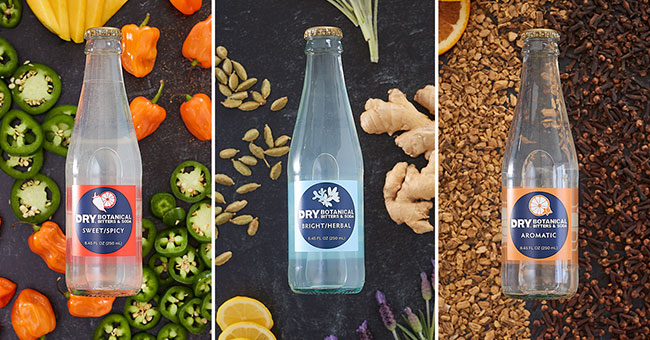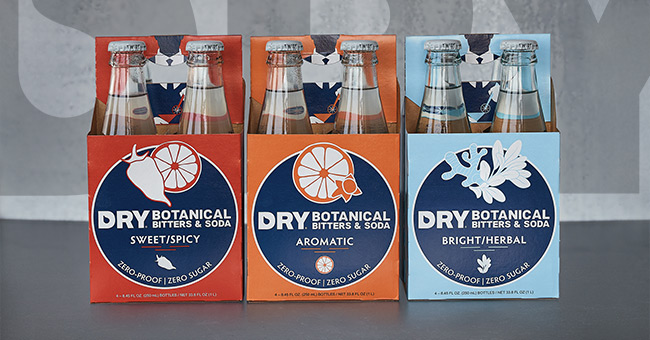The guiding principle at DRY Botanical Bubbly goes something like this: To get more people to drink less, give them more things to drink.
For the last 16 years and counting, the Washington-based company has been doing just that, offering a wide range of fruit and botanical flavored, premium, carbonated soft drinks (albeit under different names— first DRY Soda, then DRY Sparkling before adopting its current title last March). But relative to its bigger goals, the brand’s latest innovation — a three-SKU line of bitters & soda in 8.45 oz. glass bottles — represents more than just another choice for consumers on the shelf.
“For us as a company now, what we are looking at with the innovation we have coming out this year and later into next year is around that zero proof lifestyle,” said DRY founder and CEO Sharelle Klaus. “How do we increase the options and occasions for people when they don’t want to drink alcohol?”
While Klaus herself was the inspiration behind DRY’s core product, she noted that the idea for Bitters & Soda came from the bartenders and mixologists whom she had worked with over the years, particularly during the production of her zero-proof cocktail book that was published last year. Applying learnings from that experience as well as gathering flavor feedback from her mixologist partners, Klaus set about to “deconstruct what bitters and soda means,” and eventually DRY developed three varieties — Spicy Sweet, Aromatic and Bright Herbal, all of which are zero sugar — that offer a more complex, layered experience relative to its single-flavor CSDs.
“We really looked at it as light, medium, heavy,” she said. “Spicy Sweet is really for people who like brown liquors and heavier drinks. Medium (Aromatic) is very reminiscent of true bitters, with orange and spice. Light is called Bright Herbal, which has ginger, lavender and some light citrus notes.”
For Klaus, each flavor provides a different opportunity and entry point to “change the way people think about drinking,” which ties back to the principle of giving consumers more options for more occasions. As DRY developed and entered areas like zero-sugar soft drinks, she admits feeling that the company was drifting away from its original mission in following interest from some consumers and retailers who saw the brand as a better-for-you soda maker. With the help of Chief Marketing Officer Betsy Frost, Klaus has sought to reclaim DRY’s identity building around the concept of “zero-proof lifestyle” through speaking engagements, digital marketing and the aforementioned booze-free cocktail recipe book. Her vision aligns with some industry trends: according to IWSR, the global no/low alcohol category increased its share within the total beverage alcohol market to 3% last year, and is projected to grow over 31% by 2024. Within the U.S. alone, the segment grew over 30% in 2020.
“You could say it was a pivot, but a pivot back to the original mission of the company,” she said. “What’s been so exciting for us is that the industry and the world has finally caught up with that concept. The mission was social drinking for all, so getting this concept back around everyone having a chance to join the party.”
E-commerce and social media have become increasingly important tools for DRY to grow that tent: its direct-to-consumer business has grown 120% in the past year, Klaus said, as the brand has been able to reach consumers who may not typically browse the soda aisles of a store. DRY Botanical Bitters & Soda will debut online on drinkdry.com on April 19, where it will be available in 12-packs for $39.99, and on April 26 on Amazon.
Upon launching at retailers, Bitters & Soda is set to play a role in expanding the story around ‘zero proof’ on the shelf; DRY products are currently sold at over 10,000 locations across food service and grocery channels. The products will most likely fit within the mixer and premium soda set, but the bigger idea is to work with other innovative non-alcoholic beverage brands to create a set defined around elevated occasions.
“What we are looking at with some other non-alcoholic brands is starting to talk to buyers about a whole new zero-proof celebration set where you have all these different categories: NA beers, NA wines, RTDs, spirits,” said Klaus. “We would love to see that next to a mixer set, because it’s really based around occasion. All of our drinks are occasion-based at the end of the day, and right now there isn’t a place for that.”
While retailers work on their sets, Klaus and DRY are continuing to explore ways to get their message to consumers, whether through social media, speaking engagements, investing in similarly minded companies or via traditional marketing.
“At the end of the day, the question we ask is how are we making this a viable lifestyle,” she said. “From an education standpoint, it’s doing things like the Guide to Zero Proof and doing a book tour this summer and meeting with other mixologists and doing some different partnerships… Really it’s around just introducing people to this concept. This isn’t just for sober people.”

